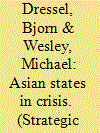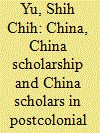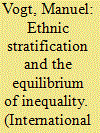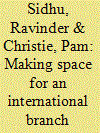|
|
|
Sort Order |
|
|
|
Items / Page
|
|
|
|
|
|
|
| Srl | Item |
| 1 |
ID:
133600


|
|
|
|
|
| Publication |
2014.
|
| Summary/Abstract |
Problems common to many Asian states suggest a pattern of crisis in Asia. The evidence suggests that the root cause is the similarity in the patterns of political development of postcolonial states. In Asia such states have attempted to reconcile state strength and internal diversity by constructing a triangular balance between identity construction, hegemonic governance and economic development. Unfortunately, this fragile balance eroded as state structures matured and economies grew, which increasingly exposed countries to escalating crises of legitimacy and instability. By highlighting changes in the postcolonial state compact within the region, this article seeks to advance both the understanding among theorists of political developments in the region and the understanding among those who govern of the roots of the current crisis.
|
|
|
|
|
|
|
|
|
|
|
|
|
|
|
|
| 2 |
ID:
130580


|
|
|
|
|
| Publication |
2014.
|
| Summary/Abstract |
China scholarship in Taiwan, in social sciences as well as humanities disciplines, is constituted by the choices of scholars over encountered and constantly reinterpreted imaginations of how China's names, identities and images are contextualised. Due to its colonial history, its civil war and Cold War legacies, and internal cleavages, China scholarship in Taiwan is characterised by strategic shifting among the Japanese, American and Chinese approaches to China, as well as their combination and recombination. The mechanism of choice, including travels that orient, reorient and disorient existing views on China, produces conjunctive scholarship. The rich repertoire of views on China, together with the politics of identity, challenge the objectivist stance of the social sciences to the extent that no view on China could be exempted from political implications and politicised social scrutiny. Concerns over exigent propriety in a social setting are internal to knowledge production. Therefore, understanding the process with which the historically derived approaches inform the China scholarship in Taiwan through the mechanism of encountering reveals both the uncertain nature of knowledge, in general, and the uncertain meaning associated with China worldwide, in particular
|
|
|
|
|
|
|
|
|
|
|
|
|
|
|
|
| 3 |
ID:
158377


|
|
|
|
|
| Summary/Abstract |
Why are ethnic movements more likely to turn violent in some multiethnic countries than in others? Focusing on the long-term legacies of European overseas colonialism, I investigate the effect of distinct ethnic cleavage types on the consequences of ethnic group mobilization. The colonial settler states and other stratified multiethnic states are characterized by an equilibrium of inequality in which historically marginalized groups lack both the organizational strength and the opportunities for armed rebellion. In contrast, ethnic mobilization in the decolonized states and other segmented multiethnic societies is more likely to trigger violent conflict. I test these arguments in a global quantitative study from 1946 to 2009, using new data on the linguistic and religious segmentation of ethnic groups. The results confirm that the extremely unequal colonial settler states experience less violence than the decolonized states and other multiethnic countries. Ethnic conflict is generally more likely the more segmented and less hierarchically structured multiethnic states are. Specifically, stable between-group hierarchies reduce the risk of governmental conflict, whereas segmentation affects secessionist violence.
|
|
|
|
|
|
|
|
|
|
|
|
|
|
|
|
| 4 |
ID:
134163


|
|
|
|
|
| Publication |
2014.
|
| Summary/Abstract |
This paper presents findings from an empirical study of an international branch campus established through a partnership between a Malaysian property development conglomerate, the Sunway Group, and Monash University, an Australian university known for its global aspirations. Using Lefebvre's concept of social space we analyse the perceived, conceived and lived spaces that constitute the campus of Monash University Malaysia and its urban setting in the township of Bandar Sunway. Dramatically transformed from a disused mining site and showcased as a 'progressive' urban project, the township symbolises the Sunway Group's commercial success and political pragmatism in managing the dynamics of Malaysia's ethnicised political economy. The broader student experience suggests that the configurations of power that shape ethnic and class relations at the scale of the national are reproduced in the composition of the student body, in students' on-campus interactions and in the rhythms of their everyday lives within the township. By attending to the material, symbolic and imaginary dimensions of one international branch campus, we provide a more nuanced and textured understanding of the globalisation of higher education, highlighting different forms of agency exercised by key actors
|
|
|
|
|
|
|
|
|
|
|
|
|
|
|
|
|
|
|
|
|